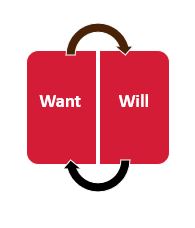Yea, the start of a new year! A time for resolutions and change, new beginnings and….pressure and stress to fulfill and maintain those plans. Usually the pressure comes with some very specific words: 
These words – which I categorize as “nagging” verbs – have a powerful impact on how you view your shiny, new resolutions, and the impact isn’t positive. “Should”, “must”, “have to” and “need to” convey obligation or guilt, while “would” and “could” often imply a passive position with no specific control over the action.
Over time, these words can alter the resolution you originally made with optimism and excitement into a burden. It’s no wonder that less than 25% of people maintain their resolutions after 30 days, and only 8% of people achieve their new year’s resolutions (Prossack, 2018). These well-intentioned plans stop feeling like a choice because we “have to” go to the gym, or we “should” start journaling, or we “need to” start being more assertive. Instead of feeling empowered to take control over a change in our lives, it ends up that we “could” start doing more for ourselves or we “would” spend more time with friends. (You might also notice that with “could” and “would”, “but” tends to follow with an excuse of why it would be hard to accomplish the plan.)
Do these sound like choices to you? Not to me either. Instead, they sound like verbal weight being added onto our shoulders.
Now you might be thinking, “C’mon, they’re just words. How can words affect my feelings or my behaviors?” Great question! To answer it, try this. Stand in front of a mirror and think of your biggest new year’s resolution. Now choose one of the nagging verbs and apply this formula:
I + {nagging verb} + {resolution}.
Say this sentence at least five times to your reflection. Notice anything? Most of us won’t be smiling when we say our resolutions. You might even notice some physical responses to the pressure created by the word choice. Did you feel a weight on your shoulders? A tension in your neck? Tightness in your stomach? Did you start to slouch or did lines appear between your eyebrows? And how is your overall mood? Are you already dreading doing the activity?
Okay, shake that off and try it this way. Say the same sentence five times again but replace the nagging verb an active verb – “want” or “will”. Watch your appearance when you are saying your resolution as a choice, as something you desire. Typically, the tension leaves your face and body. Your thoughts about the activity become positive. You might even feel powerful in terms of accomplishing your goal.

The most interesting part about changing your nagging verbs to active verbs is that you will begin to hear just how often you use the nagging verbs in your thoughts and your statements. You will catch yourself when you say something like, “I need to go grocery shopping”, “I should get up early to workout”, or “I would see my friends more often but….”. Right at that moment, you can rephrase the statements using active verbs. “I want to have food in the house that is healthy and that I like so I will go grocery shopping.” Or “I want to get up early to workout and feel good.” Or “My friends are important to me so I will schedule time to see them.”
Take just one day to notice how often you use nagging verbs for yourself. See if you can change them, in the moment, to active verbs. Then acknowledge how you feel when you start to consider your goals in terms of wants, desires and active choices. When we allow ourselves to rephase our choices in active and desirable ways, we are more likely to succeed in achieving them.
Just a little something for your own insight. – Dr. Robin
Prossack, A. (2018, December 31). This year, don’t set New Year’s resolutions [Blog post]. Retrieved from https://www.forbes.com/sites/ashiraprossack1/2018/12/31/goals-not-resolutions/#1bf57bf3879a.

